 Request a FREE Sample of our FcRn Binding Kit!
Request a FREE Sample of our FcRn Binding Kit! Request a FREE Sample of our Fc gamma RI / CD64 Binding Kit !
Request a FREE Sample of our Fc gamma RI / CD64 Binding Kit !
 Happy Holiday! Limited Keychain here with your next order
Happy Holiday! Limited Keychain here with your next order Happy Holiday! Limited Keychain here with your next order
Happy Holiday! Limited Keychain here with your next order
 Request a FREE sample of our GMP products!
Request a FREE sample of our GMP products!  Request a FREE sample of our GMP products!
Request a FREE sample of our GMP products!
> Insights > Targeting CD38/CD3 brings breakthroughs in the immunotherapy of multiple myeloma Multiple Myeloma (MM) is the second most common hematological malignancy originating from plasma cells. While the he treatment for patients of MM has significantly improved over the past 20 years, there is still a lack of cure for the disease. With the introduction of immunomodulatory drugs and proteasome inhibitors, the treatment effect of patients with MM have remarkably improved with the median overall survival (mOS) increasing from 2 years to 5-6 years. Starting in 2012, the MM treatment ushered in innovations, including the new formulations of the original drugs, antibody drugs, ADC drugs and CAR-T cell therapies.
To date, the most researched monoclonal antibody for MM targets CD38 while newer development of bispecific antibodies targeting CD38/CD3 are on the pipeline taking advantage of breakthroughs in recent studies [2].
Why choose CD38 target to treat MM?
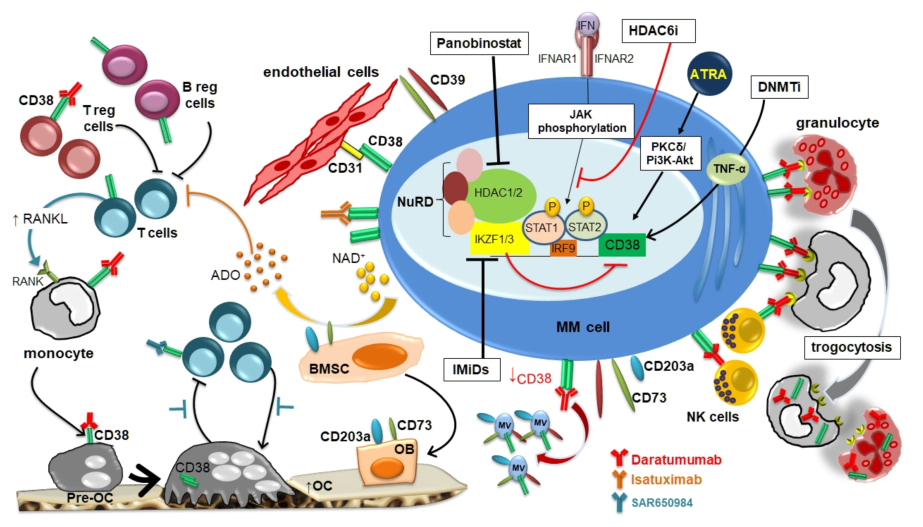
The expression and mechanism of CD38 in MM microenvironment [1]
Targeting CD38 is widely sought after in MM immunotherapy mainly because of its highly specific expression and multiple mechanisms of action:
CD38 is expressed in plasma cells generally but highly expressed on the surface of MM cells. Acting as a metabolic sensor, CD38 recognizes high concentrations of NAD+ in the bone marrow microenvironment and catalyzes the cleavage of NAD+ into cyclic adenosine diphosphate ribose (cADPR) as an extracellular enzyme . In addition, CD38 also catalyzes the production of NAADP, cADPR and NAADP by cation exchange catalyzing nicotinamide adenine dinucleotide (NADP) as a "second messenger", triggering the release of intracellular calcium ions, and promoting synthesis of adenosine (ADO) in the bone marrow microenvironment. Therefore, CD38 is a great therapeutic target as it intimately participates in MM cell growth and enables immune escape.
Daratumumab is the first monoclonal antibody targeting CD38 shows good therapeutic efficacy for MM, both as single agent and in combination with normal standard-of-care regimens. However, many patients eventually relapse because of resistance mechanisms, including FcγR-dependent downregulation of CD38 on tumor cells as well as inhibition of complement-dependent cytotoxicity (CDC), antibody-dependent cell mediated cytotoxicity (ADCC) and antibody-dependent cellular phagocytosis (ADCP) mechanisms.
CD3 proteins are hot targets for bispecific antibodies
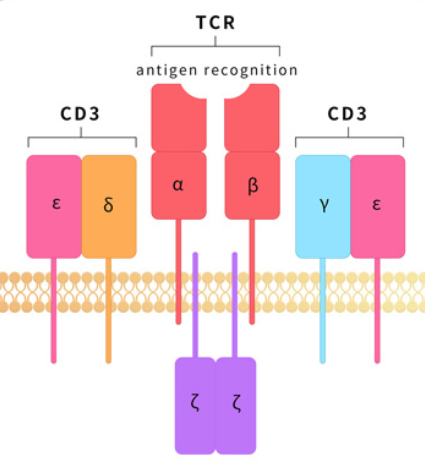
Bispecific T-cell engagers (BiTEs) are a new class of bispecific antibodies with the mechanism of action recognizing specific target antigens on the surface of tumor cells, and simultaneously targeting CD3E&CD3D or CD3E&CD3G heterodimer molecules on T cells. BiTEs recruit T cells to the vicinity of target cells to exert T cell-mediated cytotoxicity and induce tumor cell death.
Bispecific antibodies targeting CD38/CD3 to treat MM
Drug Name | Company | Research Phase |
|---|---|---|
AMG-424 | Amgen | Phase I clinical trial |
GBR-1342 | Glenmark | Phase I clinical trial |
Y-150 | YZY Biopharma | Phase I clinical trial |
Currently, there are three BiTEs targeting CD38/CD3 to treat MM, all of which are in phase I clinical trials. Recently, an anti-CD38 bispecific antibody, AMG424, was shown to eliminate MM cells in preclinical models, but also to trigger “off tumor” T-cell cytotoxicity on B, T and NK cells in-vitro.
New breakthroughs of CD38/CD3 in MM
In a recent study, researchers developed a new CD38/CD3 specific antibody (Bi38-3) based on BiTEs design [2]. Purified Bi38-3 efficiently and specifically recognizes CD38 on MM cells and bound to CD3 on T cells. The study indicates that Bi38-3 does not impair the surface expression of CD38 and only triggers T-cell-mediated killing of cells expressing high levels of CD38 with no or limited toxicity against cells expressing intermediate levels of CD38, such as hematopoietic progenitors, B, T or NK cells.
Bi38-3 readily induced MM cell death at low concentrations (10-2 ng/mL and above) without triggering significant T cell-mediated cytotoxicity to Foxp3+ regulatory T cells.
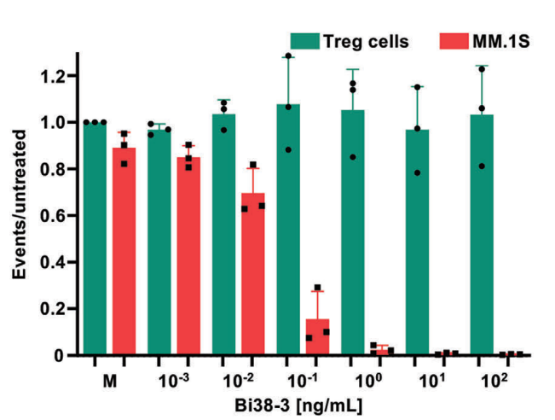
Similarly, when the concentration is lower to less than 10 ng/mL, there is no significant toxicity to CD34+ hematopoietic progenitor cells, and at the highest concentration, the toxicity to CD34+ hematopoietic progenitor cells is only moderate (>40% survival).
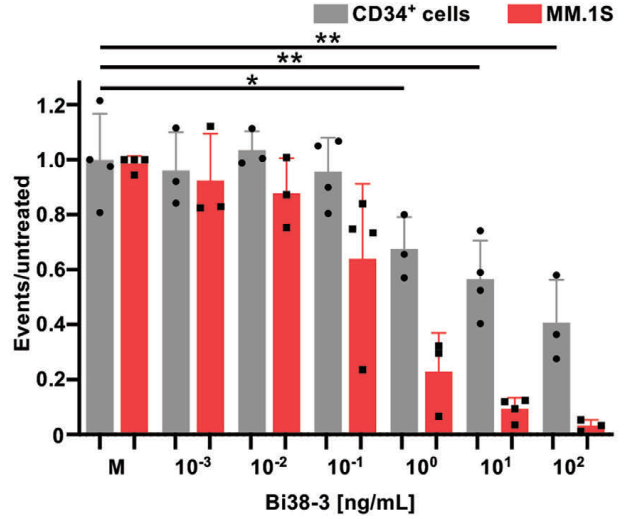
The study pointed out that this Bi38-3 may have a better effect than other specific antibodies that have also been developed targeting CD38/CD3. Importantly, Bi38-3 efficiently triggers killing of MM cells from patients who are resistant to standard treatments. Furthermore, Bi38-3 is expected to be efficient also in relapsed patients following daratumumab therapy because it recognizes a specific epitope on CD38 and lacks the Fc region.
Of course, whether Bi38-3 in this study can be used as a front-line agent (alone or in combination with other drugs) for MM patients requires further investigation. What can be firmly concluded is that with continual research advancement, immunotherapy for MM will eventually make a cure for MM a reality.
To accelerate the research and development of bispecific antibodies, ACROBiosystems provides a series of high-quality CD3 proteins with the following five advantages:
44 full range of CD3 proteins: CD3 epsilon (CD3ε), CD3 delta (CD3δ), CD3 gamma (CD3γ), CD3E&CD3D (CD3ε& CD3δ), CD3E&CD3G (CD3ε& CD3γ)
Various tags: his, his&Avi, Fc, Llama Fc, Flag
Various species: Human, Mouse, Rat, Rabbit, Cynomolgus
CD3E&CD3D and CD3E&CD3G have been confirmed as 1:1 heterodimers verified by non-reductive electrophoresis and MALS.
For example,the purity of Human CD3E&CD3D Heterodimer Protein, His Tag&Tag Free (Cat. No. CDD-H52W1) is more than 90% verified by SEC-MALS.
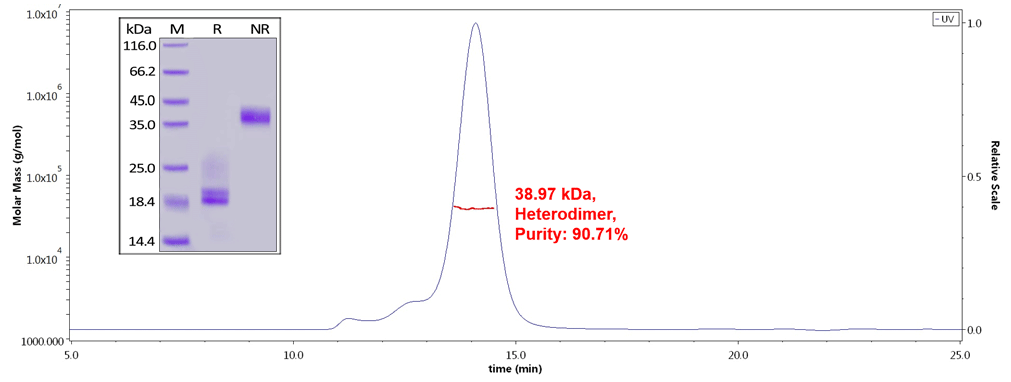
CD3 proteins are under strict quality control to guarantee the minimal batch-to-batch differences.
For example,low deviations among different batches of CD3E&CD3D (Cat. No. CDD-H52W1) as verified by ELISA.
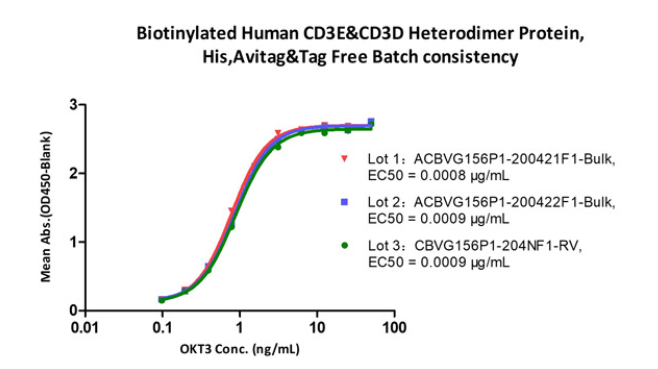
High bioactivity of CD3 proteins is verified by binding with common antibodies such as OKT3, SP34-2, UCHT1 and BCMA×CD3.
For example,biotinylated Human CD3E&CD3D heterodimer protein (Cat. No. CDD-H82W6) can specifically bind bispecific BCMA×CD3 T cell-engaging antibody with sensitivity of 15 ng/mL.
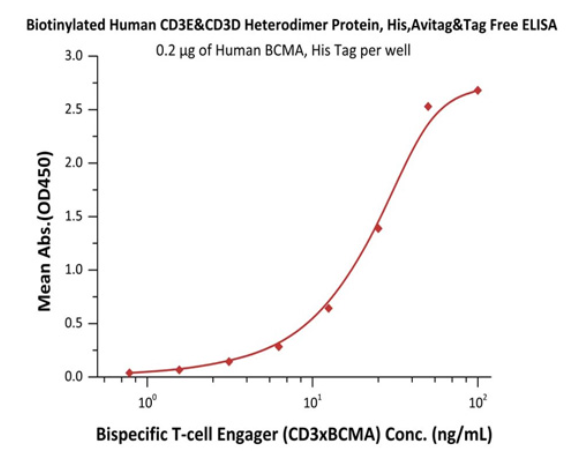
CD3 proteins are suitable for various applications at different stages of drug development, such as antibody immunotiter detection, biopanning, antibody screening, affinity characterization and clinical pharmacokinetic assays.
For example, CD3E&CD3D heterodimer protein (Cat. No.CDD-H52W1) can specifically bind CD3 X BCMA with an affinity constant of 31.8 nM as determined in the SPR assay (Biacore T200).
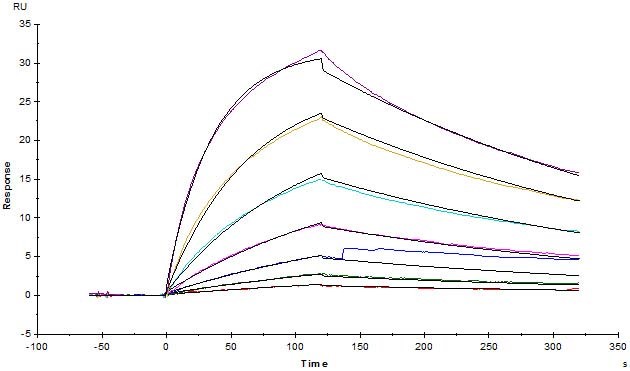
Product List——Hot CD3
| Molecule | Cat. No. | Product Description | Tag |
|---|---|---|---|
| CD3E & CD3D | CDD-H5255 | Human CD3 epsilon&CD3 delta Heterodimer Protein, Fc Tag&Fc Tag (MALS verified) | C-Fc | C-Fc |
| CDD-H52W1 | Human CD3 epsilon & CD3 delta Heterodimer Protein, His Tag&Tag Free (MALS verified) | C-8×His | Native | |
| CDD-H82W6 | Biotinylated Human CD3 epsilon&CD3 delta Heterodimer Protein, His,Avitag™&Tag Free (MALS verified) | C-10×His & C-Avi | Native | |
| CD3E & CD3G | CDG-H5253 | Human CD3 epsilon&CD3 gamma Heterodimer Protein, Fc Tag&Fc Tag (MALS verified) | C-Fc | C-Fc |
| CDG-H52W9 | Human CD3 epsilon&CD3 gamma Heterodimer Protein, Fc,His Tag&Fc,Flag Tag (MALS verified) | C-Fc & C-6×His | C-Fc & C-Flag | |
| CD3 epsilon | CDE-H5223 | Human CD3 epsilon Protein, His Tag (MALS verified) | C-10×His |
>>> Find out more CD3 proteins
ACROBiosystems provides CD38 target proteins from a variety of species (Human/ Cynomolgus/ Mouse) and with a variety of tags (His/ Avi His/ Fc) to facilitate different applications in drug development.
Product List——CD38 with high purity and bioactivity
| Cat. No. | Product Description | Tag |
|---|---|---|
| CD8-H5224 | Human CD38 Protein, His Tag (MALS verified) | His |
| CD8-H82E7 | Biotinylated Human CD38 Protein, Avitag™,His Tag | Avi, His |
| CD8-H5255 | Human CD38 Protein, Fc Tag (MALS verified) | Fc |
| CD8-H5253 | Human CD38 Protein, Mouse IgG2a Fc Tag, low endotoxin | Fc |
| CD8-H5252 | Human CD38 Protein, Llama IgG2b Fc Tag, low endotoxin | Fc |
| CD8-C5223 | Cynomolgus CD38 Protein, His Tag | His |
| CD8-M5223 | Mouse CD38 Protein, His Tag | His |
| CD8-HF255 | FITC-Labeled Human CD38 Protein, Fc Tag | Fc |
| CD8-HF2H5 | FITC-Labeled Human CD38 Protein, His Tag | His |
Partial verification data of CD38
The purity of Human CD38, His Tag (Cat. No.CD8-H5224) is more than 95% and the molecular weight of this protein is around 35-45 kDa verified by SEC-MALS.
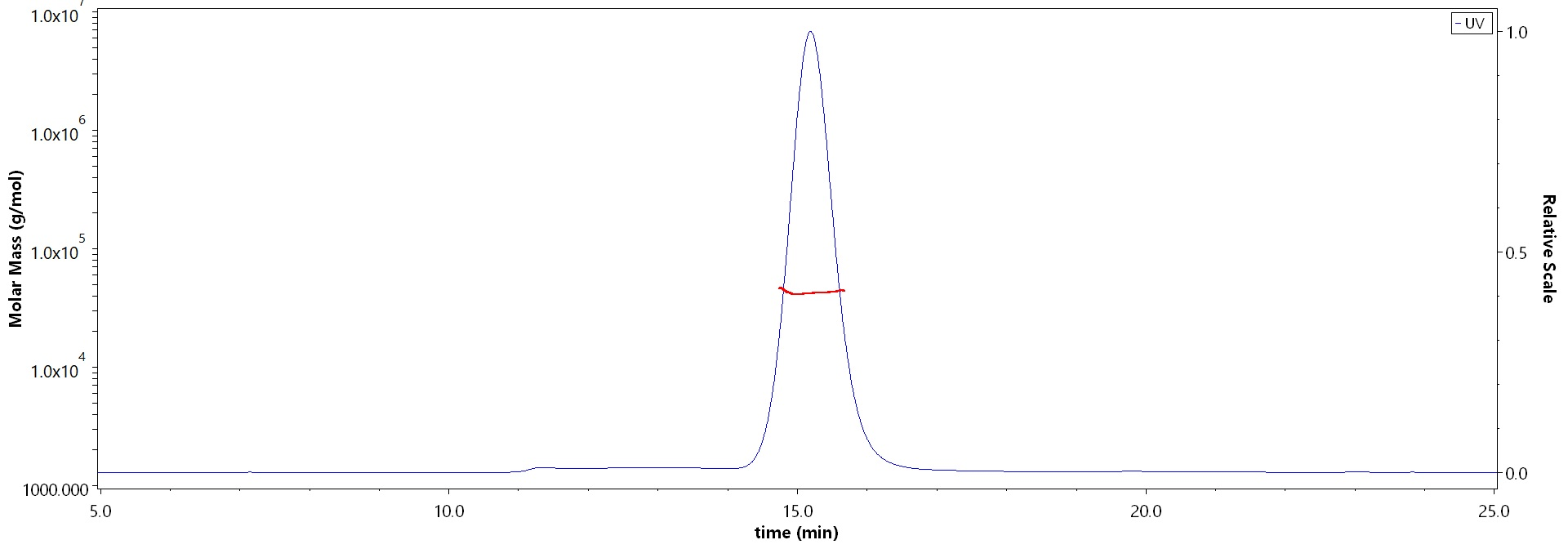
High bioactivity of Human CD38 (Cat. No. CD8-H5224) is verified by SPR assay that can bind anti-CD38 mAb (Human IgG1) with an affinity constant of 4.98 nM.
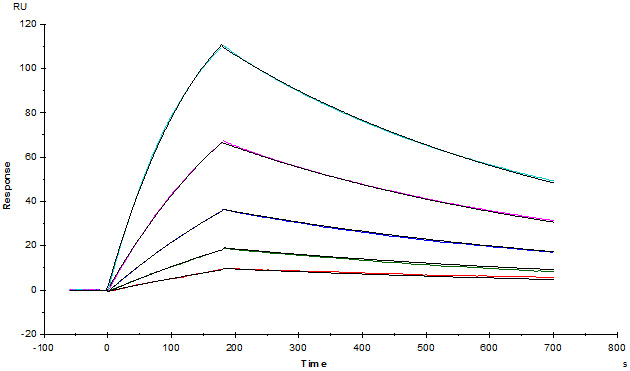
>>> Find out more CD38 proteins
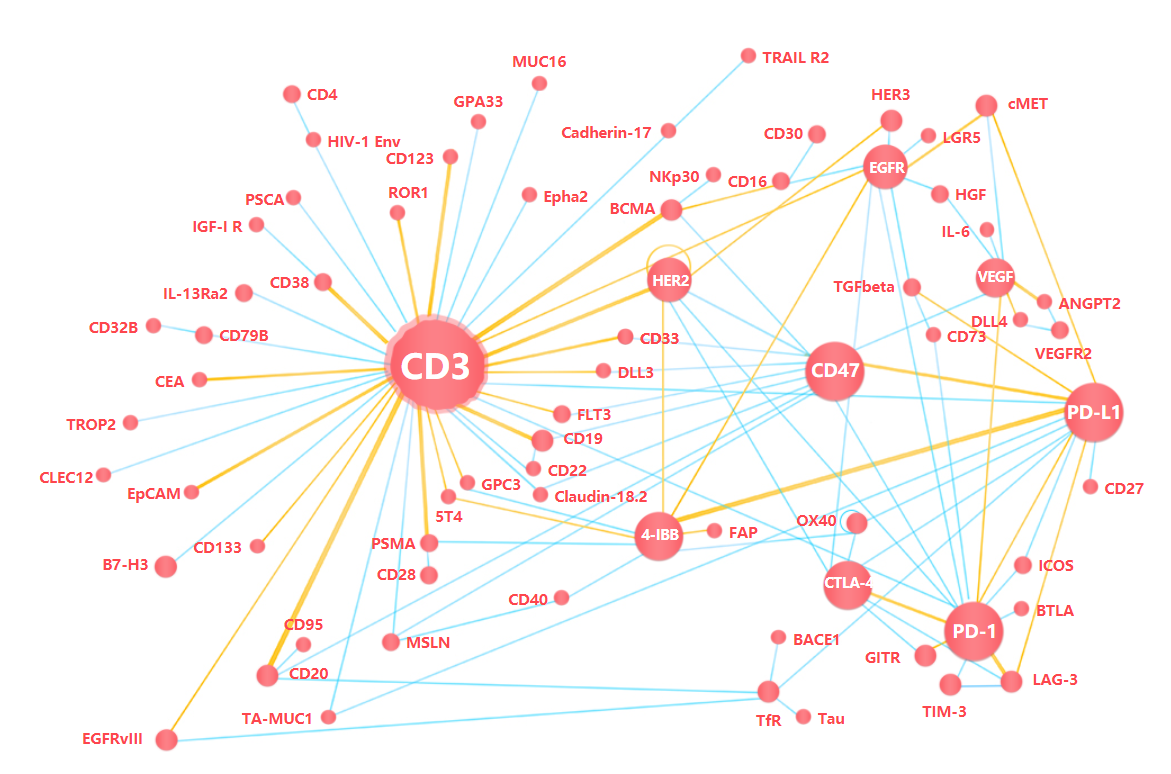
>>> Laern more about bispecific antibody targets
References
1.Federica Costa et al,CD38 Expression by Myeloma Cells and Its Role in the Context of Bone Marrow Microenvironment: Modulation by Therapeutic Agents,Cells 2019, 8 (12):1632.
2.Fayon, Maxime, et al. Bi38-3 is a novel CD38/CD3 bispecific T-cell engager with low toxicity for the treatment of multiple myeloma.haematologica 2021, 106 (4): 1193.
This web search service is supported by Google Inc.
